Black sinks might look sleek and modern, but keeping them spotless is a whole different story. One splash of hard water and the limescale shows up like a neon sign. Before you reach for the heavy-duty chemicals, there’s a much gentler fix sitting quietly in your kitchen cupboard.
Why Black Sinks are so Tricky to Keep Clean
We love a good black sink. It’s bold, it’s elegant, and it instantly upgrades any kitchen. But the downside? Every tiny limescale deposit looks like a chalk mark on a blackboard. If you live in a hard water area, you already know the drill: white stains after every rinse, no matter how carefully you wipe.
That’s because hard water is rich in minerals like calcium and magnesium, which dry into w
hitish marks—especially visible on dark surfaces. These deposits aren’t harmful, but they can dull the sink’s finish fast and make even a new sink look tired.
Most people turn to aggressive cleaners, but these can be tough on the material and not exactly eco-friendly. There’s a softer, more sustainable option you may not have tried yet—and it smells a lot better than vinegar.
Anne Hathaway Goes All In for Devil Wears Prada Sequel — and the Internet Can’t Handle It
The Common Mistakes You Need to Avoid
When it comes to cleaning your black sink, a few common mistakes can actually make the situation worse. You have to know that scrubbing too hard with steel wool or abrasive powders might seem like a quick fix, but it can scratch the surface, leaving it vulnerable to more buildup in the future. Then, letting water sit and dry on the surface may seem harmless, but it actually encourages limescale to settle in and stick.
And while harsh cleaners might seem effective, using acidic or ammonia-based products can strip away the finish or cause the color to fade over time. In the end, black sinks require a bit more care—think of them like a high-maintenance friend: treat them well, and they’ll stay beautiful for years.
The Secret Weapon: Olive Oil
Yes, you read that right. Good old olive oil—the kind you drizzle on your salad—could be your black sink’s new best friend.
This humble kitchen staple does two clever things: it helps loosen light limescale buildup and leaves behind a thin, protective layer that keeps new spots from forming too quickly. Think of it as a natural shield for your sink. No need to soak or scrub for hours.
Why Olive Oil Works (and Why It’s Better than Harsh Chemicals)
Olive oil isn’t just a quick fix—it actually works to treat the surface of your black sink, making it harder for limescale to cling. It goes beyond cleaning by hydrating the material, helping to prevent tiny cracks where buildup can begin. Unlike harsh chemical polishes, olive oil leaves behind a natural, subtle shine that enhances the sink’s appearance without any artificial gloss.
Plus, it’s safe, eco-friendly, and food-grade, so there’s no need to worry if it comes into contact with your dishes. With olive oil, you’re not just cleaning smarter—you’re embracing a more sustainable and effective way to care for your sink.







